unit 10 by the time i got outside, the bus had already left.(1a-2c)
人教版英语九年级Unit 10同步阅读(含答案)

新目标英语九年级Unit 10同步阅读(含答案)Unit 10 By the time I got outside, the bus had already left.1选择适合的词语完成下面的短文。
I’ve never been late for school, but yesterday I came very close. My alarm clock didn’t ___1___, and by the time I woke up, my father had already ___2___ into the bathroom and had to wait for him ___3___. I had to really rush, I took a quick shower, and had some breakfast, and them ___4___ to the bus stop. Unfortunately, by the time I got there, the bus had ___5___ left. I started walking, but I knew I can’t get to school ___6___ time. Luckily, my friend Tony and his dad came ___7___ in his dad’s car and they ___8___ me a ride. When I got to school, the final bell ___9___.I ___10___ made it to my class.( ) 1. A. go off B. turn off C. go on D. turn on( ) 2. A. been B. go C. gone D. went( ) 3. A. to e out B. ing inside C. to go outside D. getting into( ) 4. A. run off B. walked C. walk D. ran off( ) 5. A. never B. ever C. nearly D. already( ) 6. A. in B. at C. for D. on( ) 7. A. on B. at C. close D. here( ) 8. A. get B. gave C. give D. got( ) 9. A. was ringing B. rang C. rung D. had rung( ) 10. A. just only B. only C. only just D. just2根据短文内容选择最佳答案。
【教育学习文章】Unit 10 By the time I got outside, the bus
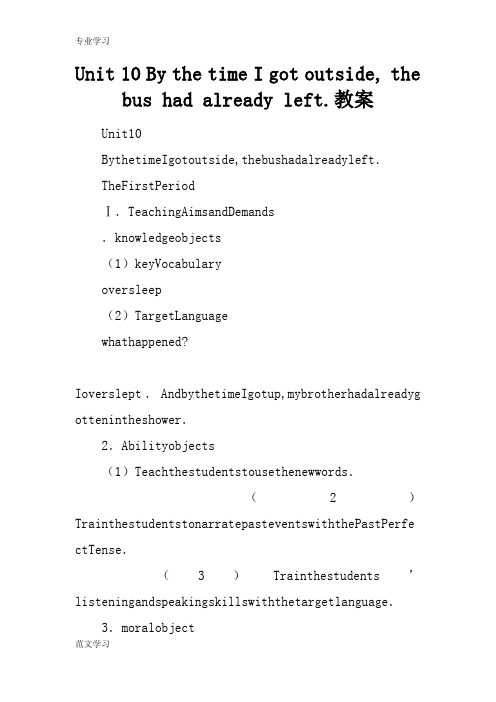
Unit 10 By the time I got outside, the bus had already left.教案Unit10BythetimeIgotoutside,thebushadalreadyleft.TheFirstPeriodⅠ.TeachingAimsandDemands.knowledgeobjects(1)keyVocabularyoversleep(2)TargetLanguagewhathappened?Ioverslept.AndbythetimeIgotup,mybrotherhadalreadyg ottenintheshower.2.Abilityobjects(1)Teachthestudentstousethenewwords.(2)TrainthestudentstonarratepasteventswiththePastPerfe ctTense.(3)Trainthestudents’listeningandspeakingskillswiththetargetlanguage.3.moralobjectIt’sagoodhabittogotobedearlyintheeveningandgetupearlyi nthemorning.Soyou’llneverbeinahurryinthemorning.Ⅱ.TeachingkeyPoints.keyVocabularyoversleep2.TargetLanguageNarratepasteventswiththePastPerfectTenseⅢ.TeachingDifficultPoints.TrainthestudentstonarratepasteventswiththePas tPerfectTense.2.Trainthestudentstounderstandthetargetlanguageins pokenconversation.Ⅳ.Teachingmethods.Thinkingofexamplesfromthestudents’reallives.2.makingsentencesbylookingatthepictures.Ⅴ.TeachingAidAtaperecorderⅥ.TeachingProceduresStepIRevision.RevisethelanguagepointsinUnit8.Asksomequestionslikethis:whatvolunteerworkwouldyoul iketodo?Helpthestudentstoanswer,I’dliketo…/Iloveto…/Ihopeto…2.PracticethedialogueinActivity3conpage62again.Ge tstudentstoroleplaythesimilardialogueswiththefollow ing.SA:I’dliketojointheschoolvolunteerproject,butI’mnotsurewhatIshoulddo.SB:whatdoyoulikedoing?SA:Iloveplayingfootball.SB:well,youcouldhelpcoachafootballteamforlittlekids .Letthechildrenpracticeinpairs.3.checkthestudents’homeworkbyaskingsomestudentstoreadtheirsentenceswit hthephrasalverbs.Thenaskthestudentstohandintheirho mework.4.Dictatethefollowingwords:cleanup,cheerup,giveout,putoff,setup,runoutof,takea fter,fixup,giveaway,callup,handout,workout,hunger,establish,commit ment,veterinarian,strategyStepⅡ1aThisactivityintroducesnewvocabularywhichcanbeusedto narratepastevents.Firstwritebythetimeontheblackboard.andtelltheclass themeaningofit."bythetime"meansnotlaterthan,before,assoonas,orwhen theindicatedcomes.whenweusethewords."Bythetime…, "wearetalkingabouttwodifferentthingsthathappenedint hepast.Saythissentencetotheclass:Bythetimetheteach ercamein,thestudentshadbegunreadingEnglish.Tellthemtonotethestruture"hadbegun"inthissentence.Begunisthepastparticipleofbegin.whenwetalkabouttwo eventsbothhappenedinthepast,theonewhichhappenedearliershoulduseandplusapastparticiple.Thewordsfollowi ngBythetime…,talkaboutthethingthathappenedlater.A ndtellthestudentswhentheyusehadplusapastparticiple, theyareusingthePastPerfectTense.Alsoexplainwhatist hepastparticipleformofaverbforthestudents.Tellthem itisasthesameasthepastformforaregularverb.Andtheyh avetoremembertheirregularverbs’participlesonebyone.Playagametohelpthestudentsunderstandthesentenceswit hthewordsBythetime…Doitlikethis:Pretendthattheteacherwillleavetheclassroomandthestu dentswilldosomethings.whentheteacherreturns.thecl asswillmakestatementsstartingwithBythetime…writeBythetimeIcameback…ontheblackboard.Saytotheclass,BythetimeIcamein.whathadhappened?Helponestudenttoanswerlikethis,Bythetimetheteacherc amein,Donhadwrittenhisnameontheblackboard.Thengetmorestudentstoanswerdifferently,suchas,Bythelimetheteachercamein,wehaddiscussedanEnglishproblem.Bythetimetheteachercamein,Ihaddrawnapicture.writethesesentencesontheblackboard,andteachthestude ntstoreadseveraltimes.Readtheinstructionstothestudentsandreadthesequestio nstotheclassaswell.whatdoyouusuallydoin,themorningbeforeschool?Doyouli kemorning?whyorwhynot?chooseonegoodstudenttoanswerthembysayingsomethinghe orsheusuallydoesinthemorning.Heorshemayanswerlikethis,Iusuallygetupearly,washmyfaceandhavebreakfast.Ilik emorningsbecausetheairisfresh,orIusuallygetupaslate aspossible.ThenIhavetowashmyfaceandhavebreakfastin ahurry.Ioftenrushtoschoolwithoutbreakfast.Sometim esIforgetsomethingathome.Idon’tlikemorningsbecauseIamalwaystoobusy.Thenhavethewholeclasspracticeinpairs.Askeachothert hequestions.Aftertheyfinishtalking,askoneortwopairstosaytheirco nversationstotheclass.correctthemistakestheymaymak ewiththeotherstudents.callthestudents’attentiontothepicturesinActivityla.Askstudentstote llwhattheysee.Say,Anysentenceswhichmakesenseareacceptedtodescribe thepictures.ThegirlinthepicturesisTina.Presentthenewwordsbypro vidingsentencesshowingthemeaningsofthemlikethis: T:whatcanyouseeinPicture1?S1:Shesleptalongtime.T:That’scorrect.Sheslepttoolate.Sheoverslept.classrepea t.Sheoverslept.Ss:Sheoverslept.T:whatdoyouseeinPicture2?S2:Herbrotherorsisterisinthebathroom.T:That’scorrect.Shewantstogointothebathroom.Shecan’tbecausesomeoneistakingashower.classrepeat.Someon eistakingashower.Ss:Someoneistakingashower.writethesewordsontheblackboard:overslept,takingashower,hadleft,leftherbackpackatho me.Thentellstudentstotalkaboutthepicturesingroupsoffou r.movearoundtheclassroom,listeningtostudentsandoff eringhelp.makesurethattheytalkinEnglish.Aftertheyallfinishtalking,askdifferentgroupstotellt heclassaboutthepictures.Theymaysaylikethis:Tinaoversleptinthemorning.Shewantedtogotothebathro om,butherbrotherhadalreadygottenintheshower.whenshegottothebusstop,thebushadalreadyleft.Shehadtoruntoschool.Aftershegottoschool,sherealize dshehadleftherbackpackathome.Thesentencescanvary,b utshouldbecorrect.StepⅢ1bThisactivitygivesstudentspracticeinunderstandingthe targetlanguageinspokenconversation.Askthestudentstoreadtheinstructionstogether.Haveth emlookatthetwocolumns,AandB,inthechart.Pointoutthe sampleanswer.Readthetwopartsofthesentence.Thengoovertheotherunconnectedpartsofsentences,too.youwillconnectthetwopartsofthesentences,connectasen tencebeginninginthefirstcolumnwiththeendofthatsente nceinthesecondcolumn.Pleaseguesstheothertwosentenc esbeforeIplaythetape.Iguessmostofthechildrencangetthecorrectsentencesbyguessing.Sojustletthemguess.Don’ttellthemwhethertheiranswersarerightorwrong.ok,justkeepyouranswersbyguessing.Let’sdecideiftheyarerightbylisteningtothetapenow.Playtherecordingforthefirsttime.Studentsonlylisten.Thenplayitasecondtime.Letstude ntsmatchtwopartsofeachsentence.checktheanswersbyas kingsomestudentstotelltheiranswers.makesurethatallofthemhavegotthecorrectanswersbylist ening.Saycongratulationstothestudentswhogettheansw erscorrectlybyguessing.Answers.b2.a3.cTapescriptBoy:Hi,Tina.youlookstressedout.Girl:Iam.Ihadabadmorning.Boy:Really?whathappened?Girl:well,firstofallIoverslept.BythetimeIgotup,mybrotherhadalreadygottenintheshower.Boy:oh,whatapain!Girl:So,afterhegotoutofshower,Itookaquickshowerandg otdressed.ButbythetimeIwentoutside,thebushadalread yleft.Boy:oh,no!Girl:oh,yes!SoIranallthewaytoschool.ButwhenIgottos chool,IrealizedIhadleftmybackpackathome.Boy:Nowonderyoulookstressedout.StepⅣ1cThispracticeprovidesguidedoralpracticeusingthetarge tlanguage.FirstplaytherecordinginActivity1b againandletthestudentsreadafterit.Doitatleasttwice.Thenreadtheinstructionstogetherwiththewholeclass.youwillmakeconversationsinpairs.EachofyouwillhavetotaketurnsbeingTina.LookatthepicturesinActivitylat ohelpyou.Tellyourpartnerwhathappenedtoyouthismorni ng.Askapairtoreadtheexampletotheclassbeforetheybeg irtSA:whathappened?SB:Ioverslept.AndbythetimeIgotup,mybrotherhadalrea dygottenintheshower.writetheconversationontheblackboard.Havethestudentsworkinpairs.movearoundtheroomofferi nglanguagesupportasneeded.Aftertheyallfinishtalking,asksomepairstosaytheircon versationstotheclass.StepⅤSummarySay,Inthisclass,we’velearnedhowtonarratepastevents,usingthePastPerfectTense.we’vealsodonesomelisteningpracticeinunderstandingtheta rgetlanguageinspokenconversation.Also,we’vedonemuchoralpracticeusingthetargetlanguage.StepⅥHomework.writeoutthestoryofTina,Notetousethetargetlang uage.2.RevisewhentousethePastPerfectTenseandtheverbstru ctureofit.StepⅦBlackboardDesignUnit9BythetimeIgotoutside,thebushadalreadyleft.SectionATheFirstPeriod.Bythetime…Bythetimetheteachercamein,thestudentshadbegunreadin g.Bythetimetheteachercamein,Donhadwrittenhisnameonthe blackboard.Bythetimetheteachercamem,wehaddiscussedanEnglishpro blem.2.Somewordstodescribethepicturesoverslept,takingas hower,hadleft,leftherbackpackathome.3.TargetLanguage:A:whathappened?B:Ioverslept.AndbythetimeIgotup,mybrotherhadalread ygottenintheshower.Unit9BythetimeIgotoutside,thebushadalreadyleft.TheSecondPeriodⅠ.TeachingAimsandDemands.knowledgeobjects(1)TargetLanguageBythetimeshegottoclass,theteacherhadalreadystartedt eaching.whenshegottoschool,sherealizedshehadleftherbackpack athome.whenIgothome,IrealizedIhadleftmykeysinthebackpack.(2)TheThreeFormsoftheverbs.2.Abilityobjects(1)Trainthestudents’listeningskill.(2)Trainthestudents’writingskillwiththetargetlanguage.(3)Trainthestudents’speakingskill.(4)Trainthestudentstousethethreeformsoftheverbs.3.moralobjectTrytobeacarefulpersonanddoeverythingcarefully.Reme mbernottobeascarelessasTina.Ⅱ.TeachingkeyPoints.Listeningpracticewiththetargetlanguage.2.Usethecorrectverbformstofillintheblanksbylisteni ng.3.makesentencesusingthePastPerfectTense.4.Thethreeformsoftheverbs.Ⅲ.TeachingDifficultPoints.writeanendingforthestoryinActivity2c.2.ThethreeverbformsinGrammarFocus.Ⅳ.Teachingmethods.Listening2.PairworkⅤ.TeachingAidsAtaperecorderⅥ.TeachingProceduresStepIRevision.RevisewhathappenedtoTinainthemorningbyaskingo neortwostudentstotellthestroyonpage68.Theymaysaylikethis:Tinahadabadmorning.Firstofallsheoverslept.Bytheti meshegotup,herbrotherhadalreadygottenintheshower.Andbythetimeshewentoutside,thebushadalreadyleft.Sh ehadtorunallthewaytoschool.whenshegottoschool,sher ealizedshehadleftherbackpackathome.Allthesemadeher lookstressedout.Afterthat,askthewholeclasstoworkin pairs,tellingthestroyandhelpingeachotherinturns.Re mindthemtousethecorrectverbforms.2.Askstudentstocheckeachother’shomeworkinpairs,pointingoutallthemistakestheymight havemade.3.RevisethePastPerfectTensebyaskingthechildrenwhen touseitandwhatitsverbstructureis.StepⅡ2aThisactivityprovidesguidedlisteningpracticeusingthe targetlanguage.wehaveknownTinahadabadmorning.ButsomethingworsehappenedtoTinalater.Let’sgotoActivity2aonpage69andseewhathappenedtoTinalate rinthemorning.Readtheinstructionstotheclass.Besurethatallofthemk nowwhattodo.callthestudents’attentiontothefourpictures.Getthemtoguessthecorrec torderofthepicturesfirst.Thefirstoneisgivenasasamp le.Askoneortwochildrentotelltheirstoriesbydescribi ngthepicturesaccordingtotheirownorder.Then,wewillhearTinatalkingaboutwhathappenedtoheraft ershegottoschool.wecanseethereisasmallboxineachpicture.Pleasewriteanumberfrom1to4ineachboxtoshoweachpictur e’scorrectorder.Thefirstonehasbeengivenasasample.GetthechildrentogetreadytolistentoTinacontinueherst ory.Playtherecordingthefirsttime,studentsonlylisten.Pl aytherecordingagainandaskthechildrentonumbereachpic ture.checktheanswerswiththeclassandseewhohaveevergotthec orrectanswerswithoutlistening.AnswersThepicturesshouldbenumberedinthisorder:3124TapescriptBoy:Sothenwhatdidyoudo,Tina?Girl:well,Iranhometogetmybackpack.ButwhenIgothome,IrealizedIhadleftmykeysinthebackpac k.Boy:you’rekidding!Girl:SoIranbacktoschoolwithoutmykeysormybackpack.A ndbythetimeIgotbacktoschool,thebellhadrung.Boy:oh,no!Girl:AndbythetimeIwalkedintoclass,theteacherhadstar tedteachingalready.Sheaskedforourhomework,butofcou rseIdidn’thaveit.StepⅢ2bThisactivitygivesstudentspracticeinunderstandingand writingthetargetlanguage.Askthestudentstoreadtheinstructionstogether.Pointo uttheblanksinthesentencesandtheverbsinthebrackets.Thisactivityhastwoparts.Firstlet’sfillintheblankswiththecorrectverbforms.wecanseeso meverbsinthebrackets.Theyarethebaseformsofthegiven verbs.Forexample,getandgot,Getisthebaseformoftheverb.yourjobistowritethecorrectformsoftheseverbsinth eblanks.Lookatnumberone.Asampleanswerisgiven.Letthestudentsfillintheblankswiththecorrectformsind ividually.movearoundtheclassroomcollectingthecommonmistakesth eymaymake.Aftertheyallfinishwriting,tellthemtogetreadytoliste ntotheconversationandchecktheiranswers.Iwillplaytherecordingagain.Pleasecheckyouranswersa ndcorrectanymistakesyoumighthavemadewhilelistening .Playtherecording.Studentslistenandchecktheiransw ers.correcttheanswersbyaskingsevendifferentstudent stosaytheirstotheclass.Answers.gothome2.realized3.hadleft4.got5.hadrung6.walked7.hadstartedStepⅣ2cThisactivitygivesstudentsoralpracticewiththetargetl anguage.Askthewholeclasstoreadtheinstructionstogether.wehaveanewtasknow.weknowTinawaslateforclass.whatd oyouthinkhappenedafterTinawaslateforclass?workwithapartner.makeupanendingforthestorybycontin uingit.Thebeginninghasbeengiven.Getstudentstodiscussinpairs.completetheending.mak esuretheyaretalkinginEnglish.movearoundtheclassroo m,offeringlanguagesupportifneeded.Aftertenminutes, askstudentstostopdiscussing.Getsomepairsofstudents totelltheclasshowtheythinkthestoryendedAndletthewho leclassdecidewhoseendingisthebest.Telleachpairtowr itedowntheirending,ordoitafterclassiftimeisnotenoug h.Sampleendingofthestory TheteacherlookedatTinaandsaid,"whyareyoulateandwhereisyourhomework,Tina?""Ihadabadmorningtoday."Tinas aidsadly."I’msorrytohearthat,butmayIknowwhathappened?saidthetea cher.ThenTinatoldtheteacherandthewholeclassherstory.All herclassmateslaughedloudlyafterit.Someofthemsaid," PoorTina!"Bob,oneofTina’sclassmates,stoodupandsaid,"well,Tina,I’dlovetohelpyou.whynotletmekeepthekeysforyou?Iwould putyourkeysinmybackpack."StepⅤGrammarFocusThisactivityintroducesthetargetlanguageofthisunit.callstudents’attentiontothesentencesontheleft.Askfourdifferents tudentstoreadthefoursentencesandpointoutwherehadplu sapastparticipleisused.writethesentencesontheblack board.Drawasimpletimelineforeachsentencetohelpstudentstou nderstandthegrammarfocus.Forexample:Thengetthestudentstolookatthebox.Teachstudentstoreadthethreeformsofeachverbsfirst.T henaskseveralstudentstoreadtheverbstotheclasstoseei ftheycanread.writetheverbsontheblackboard.Askthestudentstomakesentencescorrectlyusingeachform oftheverbsinthebox.Forexample:Iusuallygetupat6:30.Igotupat5:30yesterday.BythetimeIgotup,mysisterhadalreadygottenintheshower.Tellthestudentswhenwetalkaboutthefirstthingthathapp ened.weusehadplusapastparticiple(hadgotten)andwhenwetalkaboutthesecondthingthathappened,weuset hesimplepasttense (gotup).Asksometoreadtheirsentencestotheclass.Askthestudentstomaketheirownlistsofotherverbsusedinthisunit.Tellthemtoputthelistsintheirnotebooksusin gathree-columnformatliketheoneintheLook!section.Th elistshavetoincludetheseverbs;leave,walk,start,over sleep,ring,be.checktheanswers.Somesamplesentenceswiththethreeverbforms.Igotupat6:30everyday.Igotupat6:00yesterday.BythetimeIgotup,mysisterhadalreadygottenintheshower.2.weusuallygotoschoolat7:30.wewenttoschoolat8:30yesterday.Bythetimewegottotheclassroom,thestudentshadgonetothechemistrylab.3.myfatherleaveshomeat8:30.Helefthomeat9:30thismorning.whenmyfatherwentoutside,thebushadleft.4.Theteacheroftenstartsteachingat9:00.Theteacherstartedteachingat8:30thedaybeforeyesterda y.whenTinagottoclass,theteacherhadalreadystartedteach ing.Thethreeformsoftheverbsusedinthisunit:Leaveleftleftwalkwalkedwalkedstartstartedstartedoversleepoversleptoversleptringrangrungbewas/werebeenStepⅥSummarySay,Inthisclass,we’vedonemuchlisteningandwritingpracticewithtargetlang uage.we’vealsodonesomeoralpracticeinpairs.Andwe’vediscussedtheGrammarFocusofthisunit.StepⅦHomework.writedowntheendingofTina’sstory.2.makesentencesusingeachformoftheverbsbelow:leave,walk,start,oversleep,ring,be3.ReviewtheGrammarFocus.StepⅧBlackboardDesignUnit9BythetimeIgotoutside,thebushadalreadyleft.SectionATheSecondPeriodTargetLanguage:.Bythetimeshegotup,herbrotherhadalreadygoneint othebathroom.2.Bythetimeshewentoutside,thebushadalreadygone.3.Bythetimeshegottoclass,theteacherhadalreadystart edteaching.4.whenshegottoschool,sherealizedshehadleftherbackp ackathome.Verbs:GetgotgottenGowentgoneleaveleftleftstartstartedstartedUnit9BythetimeIgotoutside,thebushadalreadyleft.TheThirdPeriodⅠ.TeachingAimsandDemands.knowledgeobjects(1)keyVocabularybell,ring,gooff,rush,runoff,ontime,givesb.aride,lo ck,breakdown(2)TargetLanguageBythetimeIgotthere,thebushadalreadyleft.BythetimeIwokeup,myfatherhadalreadygoneintothebathr oom.2.AbilityobjectsTrainthestudents’readingskillwithtargetlanguage.Trainthestudents’speakingskillwithtargetlanguage.3.moralobjectHaveyoueverdoneanythingcarelessly?Shareyourstorywithyourfriends.Ⅱ.TeachingkeyPoints.Guidethestudentstoreadthearticleinactivity3a.2.Helpthestudentsdotheoralpracticewiththetargetlan guage.Ⅲ.TeachingDifficultPoints.Helpimprovethestudents’readingskillbyActivity3a.2.Helpthestudentsdescribewhathashappenedtothemwith thetargetlanguage.Ⅳ.Teachingmethods.Getthemainideabyreading.2.Pairwork.Ⅴ.TeachingAidAprojectorⅥ.TeachingProceduresStepⅠRevision.RevisewhathappenedtoTinabyaskingseveralstuden tstotellthestory.2.RevisethethreeformsoftheverbsinGrammarFocusbyask ingfourstudentstowritethemoutontheblackboard.3.checkhomeworkbyaskingoneortwotoreadtheirownendin gsofthestroy.4.checkhomeworkbyaskingsomestudentstoreadthesenten ceswhichtheymade.5.Askthestudentstohandintheirhomework.Somesamplesentenceswiththeverbsusedinthisunit:.Ileavehomeat7:30everymorning.Ilefthomeat8:00thismorning.BythetimeIgottotheairport,theplanehadleft.2.Iwalktoschoolsometimes.Iwalkedtoschoolyesterdayafternoon.whenIgotthere,thesickgirlhadwalkaway.3.Themeetingstartat3:00everywednesdayafternoon.Themeetingstartedat3:30lastwednesdayafternoon.Assoonasmr.jonesgottothemeetingroom,themeetinghada lreadystarted.4.Tinaseldomoversleeps.Tinaoversleptthismorning.Tinasaidshehadneveroversleptbefore.5.Thehellringsat8:10everymorning.Thebellrangat7:10thismorning.whenIgottoschool,thefirstbellhadrung.6.Iamherenow.Iwasathomelastnight.Ihadbeenherefor20yearsbytheendofXX.StepⅡ3aThisactivityprovidesreadingandwritingpracticeusingt hetargetlanguage.Showthevocabularyonthescreenbyaproject:belln.钟;铃ringv.鸣;响gooff闹钟(闹响)rushv.冲;奔rushoff跑掉;迅速离开ontime准时givesb.aride让某人搭便车lockv.锁;锁上breakdown损坏;坏掉Pointtothewordsonebyoneandteachthestudentstoreadthe m.Doitseveraltimes.Thenaskseveralstudentstoreadth ewordstoseeiftheycanpronounceeachwordcorrectly.Askthewholeclasstoreadtheinstructionstogether.Ther eisanarticleinActivity3a.yourtaskistoreadthestorya ndwritetheeventsinthecorrectorder.Havealookatthesampleanswerontherightofthearticlebef oreyoustart.Thenletthechildrencompletetheworkonthe irown.Afterawhile,asksomestudentstoreporttheiransw erstotheclass.writetheeventsontheblackboardastheyr eport,puttingtheeventsinthecorrectorder.Aftercheckingtheanswers,tellstudentstoreadthearticl eagainmorecarefully.Tellthemtofindoutthewordsorsentenceswhichtheycan’tunderstandthistime.Afewminuteslater,letthestudentsaskquestionsonthewor dsandsentenceswhichtheycan’tunderstand.Dosomeexplanationandmakesurethatthestu dentsmakeeverythingclearaboutthearticle.Thenaskthestudentstoreadthearticlealoud.movearound theclassroomwhiletheyarereading,offeringhelpasneede d.NextaskstudentstopickoutthesentenceswiththePastPerfectTense.Tellthemtounderlinethemandcomeupwiththere asontousethetence.Asktwostudentstoreadtheiranswersandexplainthesenten ces.Answers.alarmclockdidn’tgooff2.fatherwenttobathroom3.wokeuplate4.tookshower5.hadsomebreakfast6.busleft7.rantobusstop8.startedwalking9.gotaridewithafriend0.bellringing1.gottoschool2.gottoclassSentenceswiththePastPerfectTenseinthearticle:.…bythetimeIwokeup,myfatherhadalreadygoneintothebathr oomand…2.Unfortunately,bythetimeIgotthere,thebushadalread yleft.StepⅢ3bThisactivityprovidesreadingandwritingpracticeusingt hetargetlanguage.callthestudents’attentiontothephotoofthewomansleeping.Thegirlissle eping.Shemayoversleep.Howaboutyou?Haveyoueveroverslept?Getastudentstoanswerthequestionsimply,suchasyes,Iha ve./No,Ihaven’t.Thenaskonestudenttoreadtheinstructionstotheclass.wecanseesixquestionsinthebox.you’llhavetoreadthequestionsintheboxandyouhavetodescrib ethecircumstancesinwhichthesethingshappened.Explainthatdescribethecircumstancesmeanstotellwhen,whereandhowthethingshappened.Askonestudentwhohaseveroverslepttoanswerthefirstque stionanddescribethecircumstance.Helphimorherusethe PastPerfectTensetodescribethecircumstance.Thenaskstudentstoreadthequestionsandwritetheiranswe rsintheirexercisebooks.Tellthemthattheyhavetodescr ibethecircumstancesiftheiranswersareyes,andtheresho uldbeatleastonesentencewiththePastPerfectTenseineac hdescription.movearoundtheclassroomprovidingsenten cestotheoneswhoneed.Askseveralstudentstosharetheir storieswiththeclass.correctanymistakestheymaymake .Letthemchecktheanswersinpairs.StepⅣ3cThisactivityprovideslisteningandspeakingpracticeusi ngthetargetlanguage.Askthewholeclasstoreadtheinstr uctionstogether.Thencallthestudents’attentiontothesampleconversationontheright.Askapai rofthestudentstoreadtheconversationtotheclass.Plea seaskyourpartnerthequestionsinActivity3b.Askmorequestionsifheorshesays"yes".Askthestudentstoworkinpairs.Encouragethemtoaskasma nyquestionsastheycan.Astheywork,movearoundtheroomo fferinghelpandansweringquestionsasneeded.Asksomepa irstosaytheirconversationstotheclass.StepⅥSummarySay,Inthisclass,we’velearnedanarticle.Andwe’vedonemuchpracticeinreading,listening,speakingandwr iting.we’vedonemuchpracticewiththetargetlanguage.StepⅦHomework.writetheanswerstothequestionsinActivity3b.2.writeaconversationinActivity3c.StepⅧBlackboardDesignUnit9BythetimeIgotoutside,thebushadalreadyleft.SectionATheThirdPeriodAnswerstoActivity3a:.alarmclockdidn’tgooff2.fatherwenttobathroom3.wokeuplate4.tookshower5.hadsomebreakfast6.busleft7.rantobusstop8.startedwalking9.gotaridewithafriend0.bellringing1.gottoschool2.gottoclassUnit9BythetimeIgotoutside,thebushadalreadyleft.TheFourthPeriodI.TeachingAimsandDemands.knowledgeobjects(1)keyVocabularycostume,showup,exhausted,embarrassed,empty,fool,Apr ilFool’sDay,gooff,stayup(2)TargetLanguagewhenIgotthere,Ifoundthathehadfooledme.Afteranhour,theotherkidsshowldup,andIrealizedthatmy brotherhadfooledme.BythetimeIgottomatchclass,IwasexhaustedbecauseIhads tayedupallnightstudying.Ifoundoutthatmyfriendhadfooledme.2.Abilityobjects(1)Trainthestudents’writing,listeningandspeakingskillswiththetargetlang uage.(2)Trainthestudentstousethenewvocabulary.3.moralobjectHaveyoueverbeenfooledonAprilFool’sDay?Shareyourstorywithyourfriends.Ⅱ.TeachingkeyPoints.Trainthestudents’listeningandspeakingskillswithtargetlanguage.2.Teachthestudentsthenewvocabulary.Ⅲ.TeachingDifficultPoints.Guidelisteningandoralpracticeusingthetargetla nguage.2.Helplearntousethenewvocabularycorrectly.Ⅳ.Teachingmethods.Listening2.PairworkandgroupworkⅤ.TeachingAidAtaperecorderⅥ.TeachingProceduresStepIRevision.RevisethearticleinActivity3aonpage70byaskings everalstudentstoreadit.2.Dictatethefollowingwordsandphrases:bell,ring,gooff,rush,runoff,ontime,givesb.arideloc k,breakdown.3.checkthehomework.StepⅡ1aThisactivityreviewsvocabulary,introducessomenewvoca bulary,andprovideswritingpractice.Readtheinstructionstothestudents.Remembertoreadthe sentenceinthebrackets.Pointtothechartwiththethreeh eadingsNouns,VerbsandAdjectives.Readthewordsinthebracketstothestudentsandhelpthestudentstounderstandt hemeaningsofnouns,verbsandadjectives.Teachthestudentstoreadthenewvocabularybelow:costume,showup,exhausted,embarrassed,empty,fool, AprilFool’sDaywritethemontheblackboardorshowthemonascreenbyaproje ctorwhileteaching.Tellthechildrenthemeaningofeachw ordanddoalittleexplanation.Thencallthestudents’attentiontothelistofthewordsontheleft.Askastudentt oreadthemandtellthemeaningsatthesametime.Findoutth ewordswhichthestudentsdon’tunderstandandgivesomeexplanation.Pleaseputthesewordsinthecorrectcolumnsinthechart.S omewordscanbeputinmorethanonecolumn.Getastudenttoreadthesampleanswerstotheclassbeforeth eystartsay,Foolcallalsobeaverb.Forexample,Hefooled me.SoitisputinbothcolumnNounsandcolumnVerbs.Askthestudentstocompletethechartontheirown.correcttheanswersbyaskingthreestudentstoreadtheiran swerstotheclass.AnswersNouns:fool,costume,change,clockVerbs:fool,invite,empty,gooff,getup,getdressed,show up,realize,change,stayupAdjectives:embarrassed,empty,exhaustedStepⅢ1bThisactivityprovidesguidedoralpracticeusingthetarge tlanguage.Askastudenttoreadtheinstructionstotheclass.Askanotherstudenttoreadtheexampleontheright.workinpairsnow.Tellyourpartneraboutsomethingthatha shappenedtoyourecently.Notetousetwoormorephrasesfr omthelistinActivityla.Gettilestudentstotalkinpairs .movearoundtheclassroomcheckingtheirworkandofferin glanguagesupportasneeded.Aftertheyallfinishtalking,asksomepairstosaytheircon versationstotheclass.StepⅣ2aThisactivityprovidesguidedlisteningpracticeusingthe targetlanguage.SaysomethingaboutAprilFool’sDaytothestudentslikethis:EveryyearonthefirstofApril,Americansdosillythingsto surpriseeachother.Forexample,someonemighttellyouto gototheteacher’sofficetogetyournewbook.Butthereisnobookatall!callthestudents’attentiontothefourpictures.Askthestudentswhatishap peningineachpicture.Askfourdifferentstudentstodescribethepictures.Fore xample,‘theycandescribePicture1likethis:Aboywastoldtotakepartinacostumeparty.Sohedressedhi mselfuplikeamonster.Butwhenhegottherehefoundthathi sfriendhadfooledhim.Itwasn’tacostumeparty.Hefrightenedtheothers.Readtheinstructionstotheclass.you’lllistentothreeboys,Dave,Nickandjoe,talkingaboutApr ilFool’sDay.Thereisaboxundereachpicturewhereyoucanwriteeachboy’sname.Nowlistentothetapeandwritethenameofeachboyun derhispicture.Ihavetotellyoutherewillbeonepicturew ithoutanameunderit.TellthemtoseetheexampleforPicturec.Playthetapethefirsttime.Thestudentsonlylisten.The nplaythetapeagain.Askthestudentstowriteeachboy’snameinthecorrectbox.checktheanswersbyaskingdiffer entstudentstotelltheirownanswers.Answersa.Nonameb.joec.Nickd.DaveTapescriptBoy1:HaveyoueverbeenanAprilfool,Dave?Boy2:yes,Ihave.Afriendonceinvitedmetoacostumeparty.whenIgotthere,Ifoundthathehadfooledme.Itwasn’tacostumeparty.Iwastheonlypersonwearingacostume.I wasreallyembarrassed.Howaboutyou,Nick?Boy1:well,lastAprilFool’sDay,whenmyalarmwentoffIgotup,tookashower,gotdresse d,andwenttoschool.ButwhenIgotthere,theschoolwasemp ty.Iwastheonlyonethere.Afteranhour,theotherkidssh owedup,andIrealizedthatmybrotherhadfooledme.Boy3:shehad?Boy1:Uh-huh.Hehadchangedtheclocktoanhourearlier.w hathappenedtoyouonAprilFool’sDay,joe?Boy3:well,IwassicklastAprilfirst.myfriendcalledmea ndtoldmewehadamathstestthenextday.Bythetime1gotoma thsclass,IwasexhaustedbecauseIhadstayedupallnightst udying.ThenIfoundoutthatmyfriendhadfooledme.wedidn’thaveatestatall!StepⅤ2bThisactivityprovidesguidedlisteningpracticeusingthe targetlanguage.。
人教版九年级英语Unit 10 By the time I got outside, the bus had already left. SectionB说课稿
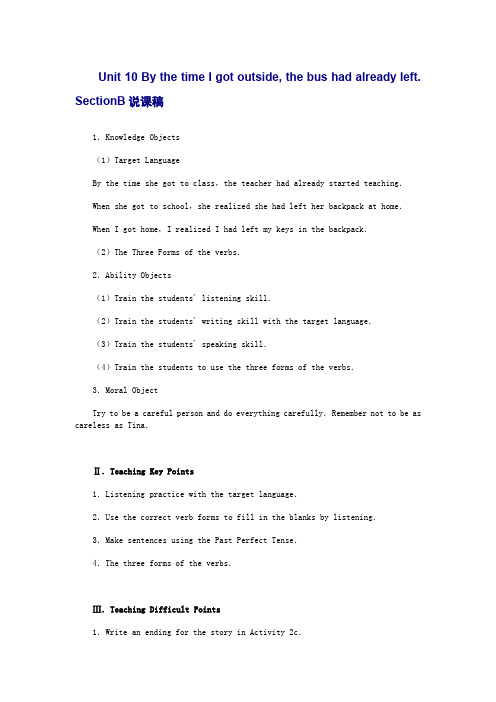
Unit 10 By the time I got outside, the bus had already left. SectionB说课稿1.Knowledge Objects(1)Target LanguageBy the time she got to class,the teacher had already started teaching.When she got to school,she realized she had left her backpack at home.When I got home,I realized I had left my keys in the backpack.(2)The Three Forms of the verbs.2.Ability Objects(1)Train the students' listening skill.(2)Train the students' writing skill with the target language.(3)Train the students' speaking skill.(4)Train the students to use the three forms of the verbs.3.Moral ObjectTry to be a careful person and do everything carefully.Remember not to be as careless as Tina.Ⅱ.Teaching Key Points1.Listening practice with the target language.2.Use the correct verb forms to fill in the blanks by listening.3.Make sentences using the Past Perfect Tense.4.The three forms of the verbs.Ⅲ.Teaching Difficult Points1.Write an ending for the story in Activity 2c.2.The three verb forms in Grammar Focus.Ⅳ.Teaching Methods1.Listening2.PairworkⅤ.Teaching AidsA tape recorderⅥ.Teaching ProceduresStep Ⅰ Revision1.Revise what happened to Tina in the morning by asking one or two students to tell the stroy on page 68.They may say like this:Tina had a bad morning.First of all she overslept.By the time she got up,her brother had already gotten in the shower.And by the time she went outside,the bus had already left.She had to run all the way to school.When she got to school,she realized she had left her backpack at home.All these made her look stressed out.After that,ask the whole class to work in pairs.telling the stroy and helping each other in turns.Remind them to use the correct verb forms.2.Ask students to check each other's homework in pairs,pointing out all the mistakes they might have made.3.Revise the Past Perfect Tense by asking the children when to use it and what its verb structure is.Step Ⅱ 2aThis activity provides guided listening practice using the target language.We have known Tina had a bad morning.But something worse happened to Tina later.Let's go to Activity 2a on page 69 and see what happened to Tina later in the morning.Read the instructions to the class.Be sure that all of them know what to do.Call the students' attention to the four pictures.Get them to guess the correct orderof the pictures first.The first one is given as a sample.Ask one or two children to tell their stories by describing the pictures according to their own order.Then,we will hear Tina talking about what happened to her after she got to school.We can see there is a small box in each picture.Please write a number from 1 to 4 in each box to show each picture's correct order.The first one has been given as a sample.Get the children to get ready to listen to Tina continue her story.Play the recording the first time,students only listen.Play the recording again and ask the children to number each picture.Check the answers with the class and see who have ever got the correct answers without listening.AnswersThe pictures should be numbered in this order:3 1 2 4TapescriptBoy:So then what did you do,Tina?Girl:Well,I ran home to get my backpack.But when I got home,I realized I had left my keys in the backpack.Boy:You're kidding!Girl :So I ran back to school without my keys or my backpack.And by the time I got back to school,the bell had rung.Boy:Oh,no!Girl:And by the time I walked into class,the teacher had started teaching already.She asked for our homework,but of course I didn't have it.Step Ⅲ 2bThis activity gives students practice in understanding and writing the target language.Ask the students to read the instructions together.Point out the blanks in the sentences and the verbs in the brackets.This activity has two parts.First let's fill in the blanks with the correct verb forms.We can see some verbs in the brackets.They are the base forms of the given verbs.For example,get and got,Get is the base form of the verb.Your job is to write the correct forms of these verbs in the blanks.Look at number one.A sample answer is given.Let the students fill in the blanks with the correct forms individually.Move around the classroom collecting the common mistakes they may make.After they all finish writing,tell them to get ready to listen to the conversation and check their answers.I will play the recording again.Please check your answers and correct any mistakes you might have made while listening.Play the recording.Students listen and check their answers.Correct the answers by asking seven different students to say theirs to the class.Answers1.got home 2.realized 3.had left 4.got 5.had rung 6.walked 7.had startedStep Ⅳ 2cThis activity gives students oral practice with the target language.Ask the whole class to read the instructions together.We have a new task now.We know Tina was late for class.What do you think happened after Tina was late for class Work with a partner.Make up an ending for the story by continuing it.The beginning has been given.Get students to discuss in pairs,Complete the ending.Make sure they are talking in English.Move around the classroom,offering language support if needed.After ten minutes,ask students to stop discussing.Get some pairs of students to tell the class how they think the story ended.And let the whole class decide whose ending is the best.Tell each pair to write down their ending,or do it after class if time is not enough.Sample ending of the storyThe teacher looked at Tina and said,“Why are you late and where is your homework,Tina?”“I had a bad morning today.”Tina said sadly.“I'm sorry to hear that,but may I know what happened?”said the teacher.Then Tina told the teacher and the whole class her story.All her classmates laughed loudly after it.Some of them said,“Poor Tina!”Bob,one of Tina's classmates,stood up and said,“Well,Tina,I'd love to help you.Why not let me keep the keys for you?I would put your keys in my backpack.”Step Ⅴ Grammar FocusThis activity introduces the target language of this unit.Call students' attention to the sentences on the left.Ask four different students to read the foursentences and point out where had plus a past participle is used.Write the sentences on the blackboard.Draw a simple time line for each sentence to help students to understand the grammar focus.For example:Then get the students to look at the box.Teach students to read the three forms of each verbs first.Then ask several students to read the verbs to the class to see if they can read.Write the verbs on the blackboard.Ask the students to make sentences correctly using each form of the verbs in the box.For example:I usually get up at 6:30.I got up at 5:30 yesterday.By the time I got up,my sister had already gotten in the shower.Tell the students when we talk about the first thing that happened.We use had plus a past participle (had gotten)and when we talk about the second thing that happened,we use the simple past tense (got up).Ask some to read their sentences to the class.Ask the students to make their own lists of other verbs used in this unit.Tell them to put the lists in their notebooks using a three-column format like the one in the Look! section.The lists have to include these verbs: leave,walk,start,oversleep,ring,be.Check the answers.Some sample sentences with the three verb forms1.I got up at 6:30 every day.I got up at 6:00 yesterday.By the time I got up,my sister had already gotten in the shower.2.We usually go to school at 7:30.We went to school at 8:30 yesterday.By the time we got to the classroom,the students had gone to the chemistry lab.3.My father leaves home at 8:30.He left home at 9:30 this morning.When my father went outside,the bus had left.4.The teacher often starts teaching at 9:00.The teacher started teaching at 8:30 the day before yesterday.When Tina got to class,the teacher had already started teaching.The three forms of the verbs used in this unit:leave left leftwalk walked walkedstart started startedoversleep overslept oversleptring rang rungbe was/were beenStep Ⅵ SummarySay,In this class,we've done much listening and writing practice with target language.We've also done some oral practice in pairs.And we've discussed the Grammar Focus of this unit.Step Ⅶ Homework1.Write down the ending of Tina's story.2.Make sentences using each form of the verbs below:leave,walk,start,oversleep,ring,be3.Review the Grammar Focus.Step Ⅷ Blackboard DesignUnit 10 By the time I got outside, the bus had already left. 复习课实录T: Good afternoon, class.Ss: Good afternoon, Miss li.T: Sit down , please.Ss: Thank you.T: Today we’ll revise Unit 10. Let’s read the title twice.The teacher shows the title on the computer. The students read the title twice.T: As usual, we can work in groups and tell your partners what other things you thought according to the main points in this unit.The students work in groups and discuss. The teacher walks around the classroom to offer some help.T: Let’s stop here. Look at the screen and we begin to check the main phases.The teacher show the main phases on the computer. The students look at the phases and speak in English. The first four answer together. Then ask some individuals to ask.1.闹响2.把…忘在…3.忘记做…4.成功做到5.等待某人做某事6.让某人搭便车7.用车接8.穿衣给某人穿衣9.出席10.成百上千的11.结婚12.和某人结婚13.激起14. 熬夜15.出故障16.经过T: Now let’s read the phrases together.The students read them twice.T: So much for phrases. Let’s revise the Grammar. What tense did we learn in this unit?Ss: 过去完成时T: Let’s revise something about it.1. 构成: had +V过分2. 过去完成时态的含义:主要是表示在过去某个时间,或是动作之前已经发生或完成的动作.也就是:过去的过去.过去完成时态的用法:1、表示过去的过去,通常由when或by引导的短语或者从句做时间状语或时间状语从句①By the end of last year, I had learned about one thousand English words. (时间提示)②When I got there, they had already left. (动作提示)2、常用在宾语从句中①He told me he had already finished his homework.②I realized he had fooled me again。
unit-10by-the-time-i-got-outsidethe-bus-had-alread

2b
1.When I got home(get home), I realized (realize) I had left (leave) my keys in the backpack. 2.By the time I got (get) back to school, the bell had rung (ring). 3.By the time I walked (walk) into class, the teacher had started(start) teaching already.
3、 review the Grammar Focus.
By the time I got outside, the bus had already left.
Section A
By the time…… 到….的时候
By the time I got home, By the time I came in, By the time I got to school, By the time the bell rang, By the time I got up,
过去的过去.
Questions:
1、What do you usually do in the morning before school?
2、Do you like mornings? Why or why not?
What do you usually do in the morning before school?
yesterday because I had seen it twice
本课出现的重要动词的过去式和过去分词
ring get go leave start be take run wake
九年级英语Unit 10 By the time I got outside, the bus had already left.教学设计(4课时)
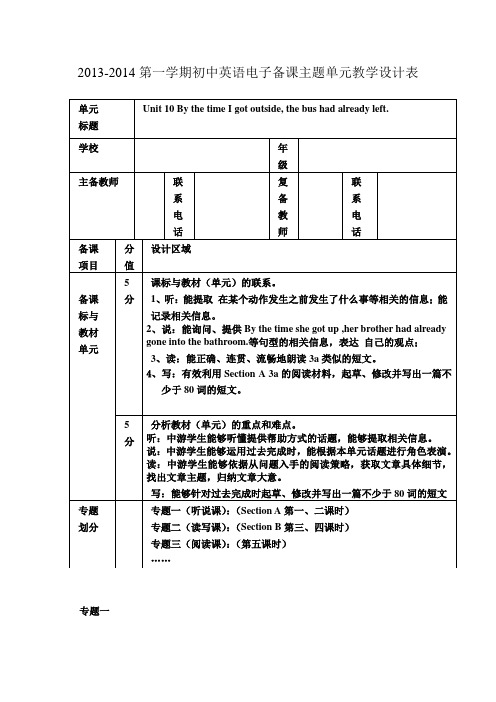
2013-2014第一学期初中英语电子备课主题单元教学设计表专题一单元 标题 Unit 10 By the time I got outside, the bus had already left.学校 年级主备教师联系电话复备教师联系电话备课项目 分值 设计区域备课标与教材单元5分课标与教材(单元)的联系。
1、听:能提取 在某个动作发生之前发生了什么事等相关的信息;能记录相关信息。
2、说:能询问、提供By the time she got up ,her brother had already gone into the bathroom.等句型的相关信息,表达 自己的观点;3、读:能正确、连贯、流畅地朗读3a 类似的短文。
4、写:有效利用Section A 3a 的阅读材料,起草、修改并写出一篇不少于80词的短文。
5分 分析教材(单元)的重点和难点。
听:中游学生能够听懂提供帮助方式的话题,能够提取相关信息。
说:中游学生能够运用过去完成时,能根据本单元话题进行角色表演。
读:中游学生能够依据从问题入手的阅读策略,获取文章具体细节,找出文章主题,归纳文章大意。
写:能够针对过去完成时起草、修改并写出一篇不少于80词的短文专题划分专题一(听说课):(Section A 第一、二课时) 专题二(读写课):(Section B 第三、四课时) 专题三(阅读课):(第五课时) ……备学情15分教法或学法:教师通过幻灯片展示S、P. 让小组交流、展示、PK 、评价使学生进行流利、准确或基本三个层次的练习。
教师积极评价。
教师引起学生兴趣的切入点:通过让学生谈论自己过去曾发生的一些有趣的事情,使学生引起学生的兴趣。
学生乐于交流参与。
备教学目标5分语言知识与语言技能目标:能够理解领悟所有单词、词组的基本含义,以及某些单词在特定语境中的意义,并能正确、熟练运用重点单词、词组;能够运用所学重点词汇、重点短语、重点语言结构句型描述提供帮助方式。
Unit 10 By the time I got outside, the bus had already left. self check

speaking
• Look at the pictures and write about Ming’s day.
Ming got up at ten o’clock in the morning.
She took her bike and went as quickly as she could to the school.
• Fill into the blanks with the proper forms of the words. • • • • • • • convincing convince (V.) ____________ (adj.) thrilling/ thrilled thrill (V.) ______________ (adj.) interested/ interesting interest (V.) ________________ (adj.) exhaust exhausted (adj.) _____________ (V.) lock lock (V.) _______________(n.) foolish fool (V. & n.) _____________ (adj.) end ending (n.) ____________ (V.)
• 3. costume
• 4.
empty
go off
• 5.
high
wide turn out get believe
sad look at turn realize
deep put on become go
• 6. put away
• 7. look
• 8. understand
h school, she realized that it was Sunday and the school was empty.
unit 10 by the timeI got to the train station,The bus had already gone

Unit 10 By the time I got outside, the bus had already left重点词汇:1. gotten get的过去分词2. oversleep 睡过头、睡得过久3. rush 冲、奔4. lock锁、锁上5. relative 亲属、亲戚6. fool愚弄、欺骗7. empty空的、排空8. embarrassed尴尬的、为难的9. describe描述、描绘10. announce宣布、宣告11. exhausted精疲力竭的12. hoax骗局、玩笑13. flee逃跑、逃走14. farmer农民15. girlfriend女朋友16. marry嫁、娶17. ending结局、结尾18. convincing令人信服的、有说服力的重点词组及句型:1.______________到......时候2. go off发出响声3. ______________跑掉、迅速离开4. ______________按时5. ______________损坏、出故障6. ______________出席7. set off 激起、引起8. ______________卖完、售光9. ______________结婚10. ______________熬夜11. give somebody a ride ______________12. flee from 从......逃走13. a piece of 一片、一块日常用语:1. -Have you ever forgotten to bring your homework to school 你曾经忘记带作业去学校吗?-Yes, I have. 是的,忘记过。
2. Last Friday night, my friend invited me to watch some videos.上星期五晚上我的朋友邀请我看录像。
九年级英语Unit10 By the time I got outside,the bus had already left.讲解及练习

第 1 页 (共4 页) 第 2 页 (共4 页)学校 姓名 班级 考场 考号---------------------------------○密------------------ -------------------○封----------------------------- -- --○线----------------------------※※※※※※※※※※※※※※※答※※※※※※※※※※※※※※※※※※题※※※※※※※※※※※※※※※※线※※※※※※※※※※※※※九年级英语Unit10 By the time I got outside,the bus hadalready left.讲解及练习1. 过去完成时(1) 构成:由助动词had + 过去分词 构成 否定式:had not + 过去分词 缩写形式:hadn‘t (2) 用法 过去完成时表示在过去某一时间或动作之前已经发生或完成了的动作。
(3) 它所表示的时间是―过去的过去‖。
①表示过去某一时间可用by, before 等构成的短语来表示②也可以用when, before, after 等引导的时间状语从句来表示 ③还可以通过宾语从句或通过上下文暗示。
When I got there, you had already eaten you meal. 当我到达那里时,你已经开始吃了。
By the time he got here, the bus had left. 到他到达这里时,汽车已经离开了2. by the time 直到…时候 指从过去某一点到从句所示的时间为止的一段时 如: By the time we got to his house, he had finished supper. 在我们到达他就已经吃完了晚饭。
3. 英语中表示―把某物遗忘在某处‖常用 leave + 地点 而不是forget+地点 如:Unluckily, I left my book at home . 不幸的是,我把书忘在家里了。
九年级英语by the time i got outside,the bus had already left练习题3

Unit 10 By the time I got outside,the bus had already left.温故知新(课前复习类训练)●Word recycling and grammar reviewing(旧词循环和语法复习)Ⅰ.Write down the correct form of the word according to the request.(根据要求写出单词的相应形式。
)1.teach(名词)______________2.leave(过去式) ______________3.reply(同义词) ______________4.realize(现在分词) ______________5.forget(过去分词) ______________6.early(比较级)______________7.final(副词) ______________ 8.ring(过去分词) ______________9.dress(第三人称单数形式) ______________ 10.really(形容词) ______________答案:1.teacher 2.left 3.answer 4.realizing 5.forgotten 6.earlier7.finally8.rung 9.dresses10.realⅡ.Fill in the blank with the right word form.(用单词的适当形式填空。
)1. _________they_________(get)to the farm on time last Monday?2.You can finish the work_________(easy).3.I _________never_________(be)late for school.4.you ever_________(forget)a relative’s birthday?5.They gave me a_________(ride)on the way to school.答案:1.Did,get由last Monday可知应用一般过去时。
Unit_10__by_the_time_I_got_outside._the_bus_had_already_left._教学建议
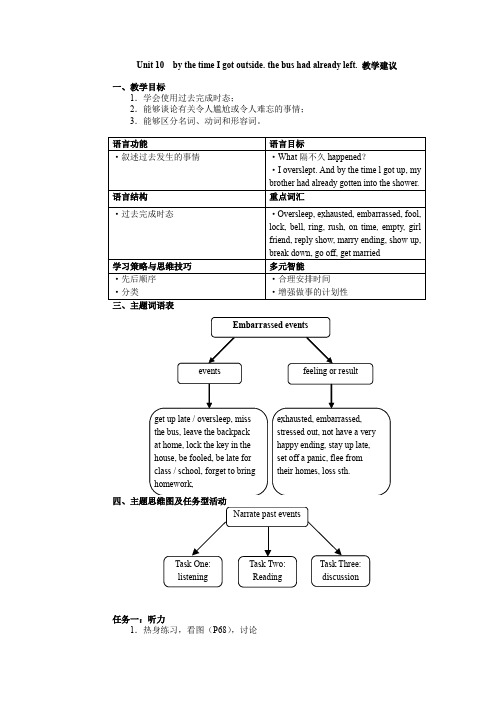
Unit 10 by the time I got outside. the bus had already left. 教学建议一、教学目标1.学会使用过去完成时态;2.能够谈论有关令人尴尬或令人难忘的事情;3.能够区分名词、动词和形容词。
任务一:听力1.热身练习,看图(P68),讨论What do you usually do in the morning before school?Do you get up early in the morning?Are you late for school?What happened to Tina?2.通过听力练习,帮助学生输入地道的语言材料,为提高学生口语表达能力及输出奠定基础。
任务二:阅读1.通过阅读训练,培养学生获取信息的能力,同时巩固句型和扩大词汇量2.学会欣赏,在学生获取信息的基础上,引导学生欣赏和积累优美、正确、地道的语言材料,为口语和书面表达奠定基础。
3.通过阅读,了解到西方国家愚人节发生的事情,并引导学生理智地分析所发生的事件任务三:讨论1.叙述Tina的经历,并为其经历续写结尾2.回忆并叙述我们生活中经历的尴尬事情3.回忆并叙述生活中难以忘怀的事情五、可供教师选择的任务活动Sample 1 Tina尴尬的早晨(with the help of the pictures on the book), 并为故事续写结尾。
引导学生用过去完成时态,叙述事情,注意事情发生的先后顺序,发挥想象给出一个合理的结尾。
操作建议:1.完成听力任务(1b, 2a & ab)朗读对话,加强语言输入2.同桌之间根据图示以第三人称叙述Tina的经历3.全班共同讨论故事的结尾,看谁给出的结尾更符合逻辑关系又体现人与人之间的友爱。
拓展的词汇:forgive, stationeries, habitsSample 2 谈谈上周的某天或进来的某个早晨发生的事情。
Unit;10;By;the;time;I;got;outside,;the;bus;had;alr

Unit;10;By;the;time;I;got;outside,;the;bus;had;already;left.unit 10 by the time i got outside, the bus had already left.一. 教学内容:unit 10 by the time i got outside, the bus had already left.【学习目标】1. 通过本单元的学习,驾驭过去完成时态的用法,特殊是与一般过去时态和此时此刻完成时态的区分。
2. 合理支配自己的学习和生活,守时守信。
二、教学重点难点:过去完成时态的用法及本模块中的一些重点短语三、重点词和短语1. by the time 到……时候2. get dressed 穿衣服3. run all the way to school 一路跑向学校4. leave +物+地点把某物落在某地【即学即用】he his umbrella in the train.a. leaveb. leftc. forgotd. forget5. no wonder 难怪6. run back to school 跑回学校7. start doing / to do 起先做某事8. go off 发出响声【即学即用】in the morning, i didn’t hear my alarm clock .a. going offb. went offc. go offd. to go off9. wait for sb. to do sth. 等待某人做某事10. run off / away 跑掉离开11. unfortunately 不幸地luckily 幸运地【即学即用】, he didn’t pass the english exam again.a. luckilyb. fortunatelyc. unfortunatelyd. unfortunate12. on time 准时in time 刚好【即学即用】people to the meeting all arrived here .a. in timeb. on timec. after timed. for time13. give sb a ride 让某人搭便车【即学即用】he walked me and asked where i was going and told me that they offered to .a. by; give me a rideb. off; give me ridesc. by; give me some feetd. through; give me a walking make it14. break down 出故障【即学即用】my bike on my way to school, so i had to walk there.a. broke outb. broke inc. broke downd. broke away15. show up 出席;露面【即学即用】he didn’t until supper was nearly over.a. show offb. show upc. show roundd. show in16. stay up late 熬夜到很晚stay up all night studying 熬夜学习17. costume party 化装舞会18. happen to sb 某人发生了什么事happen to do 碰巧做某事19. set off 激起set off=set out 启程/起程【即学即用】his action a heated argument.a. set outb. set upc. set offd. set free20. across the whole country 普及整个城市21. thousands of 成千上万22. flee-fled-fled 逃离flee from + 地点从某地逃离flee away 逃离/逃跑23. sell out 卖光24. marry sb=get/be married to sb 和某人结婚四、重点、难点、考点及疑点注释1. i started walking, but i knew i couldn’t get to school on time. 我起先步行,但我知道我已经不能按时到达学校了。
Unit 10 By the time I got outside, the bus had already left. section B

Do you know April Fool’s Day? What do you usually do on April Fool’s Day?
• Words which are both V. and adj. empty clean long Any others? deep Any others? • Words which are both adj. and adv. late hard wide
speaking
• Make a conversation with your partner about the things that happen recently. Use the words or phrases from the list above.
Listen 2a a. Joe Listen 2b D 1. ____ a costume party
2. ____ my alarm went off N
b.
Nick
c.
Dave
d.
J 4. ____ was exhausted
5. ____ realed up all night
• 4.It is announced in the broadcast that the meeting will be put off. Tell sth publicly
reading
• Read the three stories and decide whether these sentences are true or false. • 1. the aliens from Mars landed on the earth. F • 2. there were not many people who believe the story told by Welles. F • 3. there will be no spaghetti because farmers in Italy don’t want grow it. F • 4. people were fooled by the reporter. T • 5. the TV star’s girlfriend will marry him. F • 6. people don’t like the famous star after the joke. T
陕西省西安市庆安中学2020届九年级英语全册 Unit 10 By the time I got outside, the bus had already left
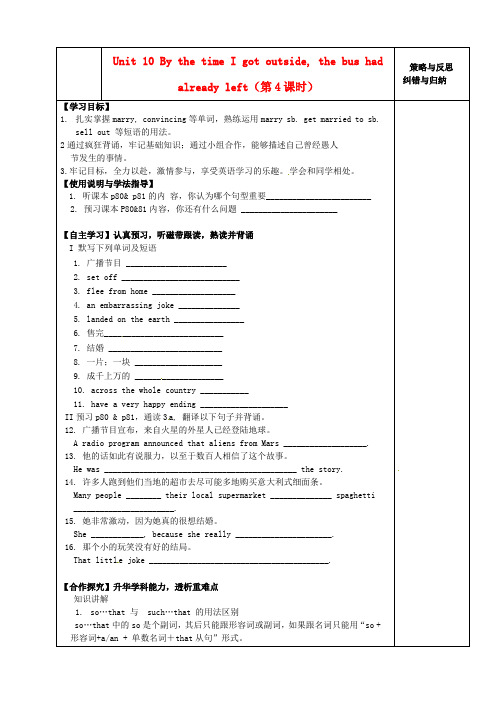
Unit 10 By the time I got outside, the bus had already left(第4课时)策略与反思纠错与归纳【学习目标】1.扎实掌握marry, convincing等单词,熟练运用marry sb. get married to sb.sell out 等短语的用法。
2通过疯狂背诵,牢记基础知识;通过小组合作,能够描述自己曾经愚人节发生的事情。
3.牢记目标,全力以赴,激情参与,享受英语学习的乐趣。
学会和同学相处。
【使用说明与学法指导】1. 听课本p80& p81的内容,你认为哪个句型重要________________________2. 预习课本P80&81内容,你还有什么问题 ______________________【自主学习】认真预习,听磁带跟读,熟读并背诵I 默写下列单词及短语1. 广播节目 _______________________2. set off ___________________________3. flee from home ___________________4. an embarrassing joke ______________5. landed on the earth ________________6. 售完___________________________7. 结婚 __________________________8. 一片;一块 ____________________9. 成千上万的 ____________________10. across the whole country ___________11. have a very happy ending ____________________II预习p80 & p81,通读3a, 翻译以下句子并背诵。
12. 广播节目宣布,来自火星的外星人已经登陆地球。
九年级英语_Unit_10_By_the_time_got_outside__the_bus_had_already_left导学练_人教新目标版
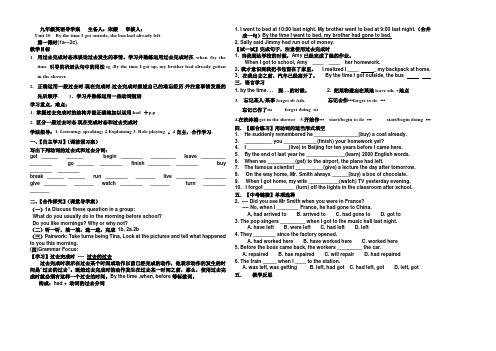
九年级英语导学案主备人:宋媛审核人:Unit 10 By the time I got outside, the bus had already left第一课时(1a—2c).教学目标1.用过去完成时态来谈论过去发生的事情。
学习并熟练运用过去完成时在when /by thetime 引导的状语从句中的用法eg .By the time I got up, my brother had already gotten in the shower.2.正确运用一般过去时,现在完成时,过去完成时叙述自己的难忘经历,并注意事情发展的先后顺序. 3.学习并熟练运用一些动词短语学习重点,难点:1. 掌握过去完成时的结构并能正确地加以运用.had +p.p2. 区分一般过去时态,现在完成时态和过去完成时学法指导:1. Listening; speaking;.2.Explaining 3. Role playing 。
4自主,合作学习.一、【自主学习】(课前预习案)写出下列动词的过去式和过去分词:get ______ ______ begin ________ _________ leave _________ ________ go ______ ________ finish ________ ________ buy ________ ________break ______ ______ run ________ _______ live _______ ________ give ________ _______ watch ________ _______ turn ________ _______二、【合作探究】(课堂导学案)(一)1a Discuss these question in a group:What do you usually do in the morning before school?Do you like mornings? Why or why not?(二)听一听,填一填,选一选,完成1b, 2a.2b(三)Pairwork: Take turns being Tina, Look at the pictures and tell what happened to you this morning.(四)Grammar Focus:【学习】过去完成时---- 过去的过去过去完成时表示在过去某个时间或动作以前已经完成的动作,他表示动作的发生的时间是―过去的过去‖。
Unit 10 By the time I got outside, the bus had already left
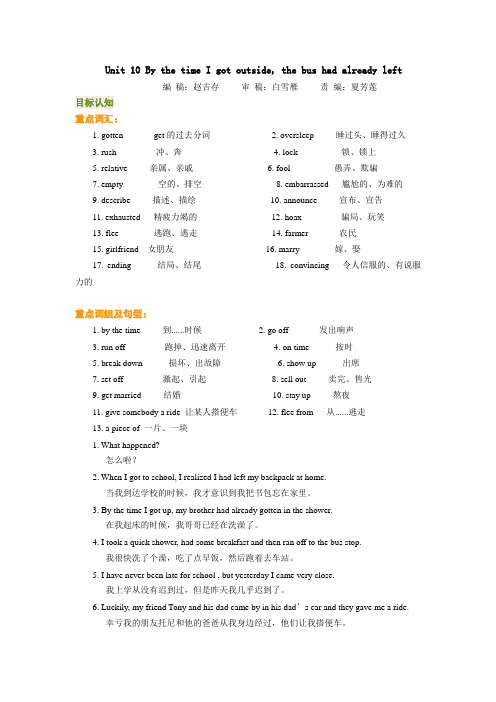
Unit 10 By the time I got outside, the bus had already left编稿:赵吉存审稿:白雪雁责编:夏芳莲目标认知重点词汇:1. gotten get的过去分词2. oversleep 睡过头、睡得过久3. rush 冲、奔4. lock锁、锁上5. relative 亲属、亲戚6. fool愚弄、欺骗7. empty空的、排空8. embarrassed尴尬的、为难的9. describe描述、描绘10. announce宣布、宣告11. exhausted精疲力竭的12. hoax骗局、玩笑13. flee逃跑、逃走14. farmer农民15. girlfriend女朋友16. marry嫁、娶17. ending结局、结尾18. convincing令人信服的、有说服力的重点词组及句型:1. by the time 到......时候2. go off发出响声3. run off 跑掉、迅速离开4. on time按时5. break down损坏、出故障6. show up出席7. set off 激起、引起8. sell out 卖完、售光9. get married 结婚10. stay up 熬夜11. give somebody a ride 让某人搭便车12. flee from 从......逃走13. a piece of 一片、一块1. What happened?怎么啦?2. When I got to school, I realized I had left my backpack at home.当我到达学校的时候,我才意识到我把书包忘在家里。
3. By the time I got up, my brother had already gotten in the shower.在我起床的时候,我哥哥已经在洗澡了。
Unit 10 By the time I got outside, the bus had already left. grammar

6. 昨天找看见李平了。自从我们离开北京,就一直 没有见面。 I saw Li Ping yesterday. We had not seen each other since we left Beijing.
7. 我昨天没有给魏华那本书,因为她已经为自己买 了一本。 I did not give the book to Wei Hua yesterday, because she had already bought a copy for herself.
did not go • 6. Last night we __________ back home until the teacher left school. (not go) was put • 7. Comrade Li Dazhao __________ in prison in 1927. (put) • 8. I'll tell him the news as soon as he comes __________ back. (come) to have • 9. John stopped __________ a rest (have) has worked because he __________ for three hours. (work) • 10. I haven’t heard from my daughter since last _______________ month. (hear from)
七、过去完成时的用法
1、概念:表示过去的过去。 -----------|----------------|--------------------|----> 那时 过去分词 构成 否定式:had not + 过去分词 缩写形式:hadn’t
九年级新目标英语unit10短语和重要句型归纳

九年级新目标英语unit10短语和重要句型归纳unit10.by the time i got outside the bus had already left.一、重点短语section a1.到…的时候_____________2.淋浴____________3.进浴室____________4.从浴室出来______________5.把…忘在家里______________6. (闹钟)闹响_____________7.迅速离开______________ 8.捎某人一程_____________9.停止运转、出故障_________________10.出席、露面____________11.愚人节________________12.激起,引起______________13.卖完,售完___________ _______________14.结婚_______________ 15.一片,一块____________ 16.到他起床的时候,他的哥哥已经进浴室了._____________________17.到他进教室的时候,老师已经开始讲课了。
______________________18.为这个故事编个结尾____________________19.和某人分享…________________20.等候某人做某事______________________ 21.出来,花开,出版______________22.准时______________23.及时____________ 24.难怪、怪不得_____________25.成功_____________26.穿好衣服____________ 27.从旁边经过、路过_____________28.让某人搭车_____________section b29.邀请某人做某事_______________30.化装舞会_____________ 31.熬夜_____________32大卫在愚人节那天发生了什么事?______________________ 33. 在第一天_____________34. 近几年中国发生了巨大的变化。
九年级英语By the time I got outside,the bus had already left练习题1
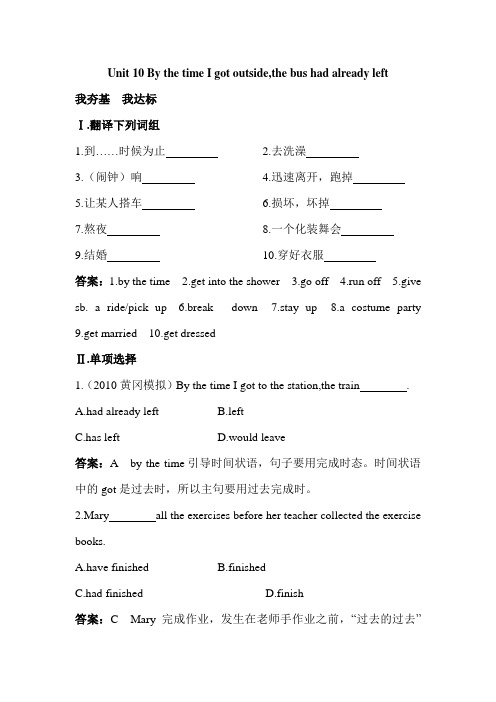
Unit 10 By the time I got outside,the bus had already left我夯基我达标Ⅰ.翻译下列词组1.到……时候为止2.去洗澡3.(闹钟)响4.迅速离开,跑掉5.让某人搭车6.损坏,坏掉7.熬夜8.一个化装舞会 9.结婚10.穿好衣服答案:1.by the time 2.get into the shower 3.go off 4.run off 5.give sb. a ride/pick up 6.break down7.stay up8.a costume party 9.get married10.get dressedⅡ.单项选择1.(2010黄冈模拟)By the time I got to the station,the train.A.had already leftB.leftC.has leftD.would leave答案:A by the time引导时间状语,句子要用完成时态。
时间状语中的got是过去时,所以主句要用过去完成时。
2.Mary all the exercises before her teacher collected the exercise books.A.have finishedB.finishedC.had finishedD.finish答案:C Mary完成作业,发生在老师手作业之前,“过去的过去”用过去完成时。
3.The people heard the bad news that the hero several hours ago.A.had diedB.has diedC.diedD.dies答案:A die这个动作发生在heard之前,发生在过去的过去。
4.By the time he was fourteen,he up a small chemistry lab.A.had setB.has setC.setD.sets答案:A by the time 加上一般过去时态,主句用过去完成时态。
Unit10--By-the-time-I-got-outside.九年级第十单元

Unit10--By-the-time-I-got-outside.九年级第十单元Unit10 By the time I got outside,the bus had already leftI.高频词组1.by the time 到........时候2.go off 发出响声,闹响3.run off/away 跑掉,离开4.on time 准时5.break down /out 损坏;;爆发6.show up 出席,路面7.set off 启程,引起8.get married 结婚9.rush at/out of 朝某人冲;冲出.......地方10. feel /get exhausted 筋疲力竭11.convince sb of sth 是某人相信某事12.in one’s forties 在某人四十几岁13.sell out 卖光14.get dressed 穿衣服15.no wonder 难怪16.happen to sb 发生在某人身上II.重点词法知识1.到…时候by the time +…(句子)…从过去某一点到从句所示时间为止的一段时间,即从句用过去时,主句用过去完成时。
2.(闹钟)闹响go off3.跑掉;迅速离开run off4.损坏break down (突然)中断break off5.(在)愚人节(on) April Fool's Day6.激起;引起set off7.一片,一块a piece of8.按时on time 及时in timeSection A1.从…离开去…leave (from)…for …把某物遗忘在某地leave sth. +介宾短语(表地点的)忘记某人/某事forget sb /sth.忘记去作…forget to do …忘记已作了…forget doing …2.在洗沐浴get in the shower3.开始作…start/begin to do …(前后不同的事)start/begin doing …(前后相同的事)4.我上学从未迟到,但昨天我差点迟到.I 've never been late for school ,but yesterday I came very close.5.等待(某人)作…wait (for sb )to do …6.出来;开花come out 实现come ture 从旁而过come by 来自…come/be from…7.我必须抓紧了.I had to really rush.8.飞快冲了个澡take/have a quick shower9.给/让某人搭便车give/get sb. a ride =give /get a ride to sb.10.我恰好赶上上课.I only just made it to my class.(此时,指"约定"之意)Section B1.给某人穿衣服dress sb.穿(…)衣服be /get dressed (in +衣服)化装;打扮dress up2.熬夜stay /sit up (late)3.给某人看某物show sb .sth.=show sth .to sb.带某人参观…show sb.around sth.卖弄…show off…出席,露面show up展览be on show =be on display4.化妆舞会a costume party5.在地球着陆land on the earth6.由演员奥森·威尔斯主持的广播节目a radio program by actor Orsom Welles7.遍及全国across the whole country =all over the whole country8.从…逃跑;避开…flee from…=run away from…(flee过去式为fled )9.将有…the re will be ….(一般将来时)there would be …(过去将来时)10.买尽可能多的意大利面条buy as much spaghetti as they could /possible11.让某人嫁过某人ask sb .to marry sb.结婚get married和…结婚get /be married with …=marry …12.停止作…stop doing … 停下某事来作…stop to do …13.在开学第一天on the first day of school14.(向某人)打招呼say hello (to sb.)15.醒来wake up 叫…醒来wake sb. up16. 有一个很愉快的结局have a very happy ending17.失去了他的女朋友和他的观众lose both his girlfriend and his showIII .重要句型1.By the time I hot out,the bus had already left.2.When I got to school, I realized that I had left my backpack left.3.Wells was so convincing that hundreds of people believed the story ,and panic set of across the whole country.IV..语法. 过去完成时(1) 构成:由助动词had + 过去分词构成否定式:had not + 过去分词缩写形式:hadn’t(2) 用法:过去完成时表示在过去某一时间或动作之前已经发生或完成了的动作。
人教新目标版英语九《Unit 10 By the time I got outside, the bus had already left》
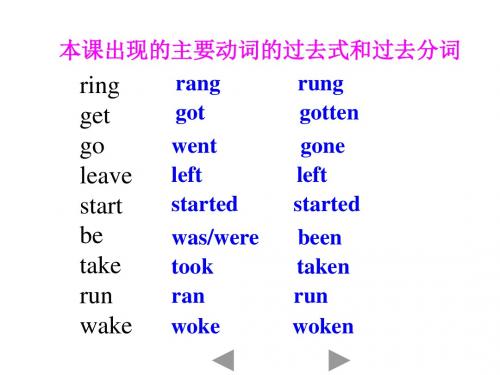
3. wait for sb. wait to do sth.
“等某人”, “等着做某事”,
wait for sb to do sth. “等某人做某事”。
4. on time
at any time
准时
in time
all the time
及时
一直;始终 有时,不时
H.the movie had started.
Grammar Focus
1. Past perfect Tense 过去完成时
构成:had+过去分词
2. 过去完成时可以表示过去某一时刻
或某一动作之前完成的动作或呈现
的状态。也就是说发生在“过去的
过去”。
The Past Perfect Tense 过去完成时
过去完成时态的用法:
1、表示过去的过去,通常由when或by引导 的短语或者从句做时间状语或时间状语从 句 ① By the end of last year, I had learned about one thousand English words ② By the time he was twenty, he had won about ten medals ③ When I got there, they had already left
(3) give sb. a ride 意为 “让某人搭便车” ride n. e.g. If you go to the school, I can give you a ride. get a ride 意为“搭便车”。 e.g. I want to get a ride. 我想搭个便车。
6. I only just made it to my class. 我恰好到教室。
- 1、下载文档前请自行甄别文档内容的完整性,平台不提供额外的编辑、内容补充、找答案等附加服务。
- 2、"仅部分预览"的文档,不可在线预览部分如存在完整性等问题,可反馈申请退款(可完整预览的文档不适用该条件!)。
- 3、如文档侵犯您的权益,请联系客服反馈,我们会尽快为您处理(人工客服工作时间:9:00-18:30)。
8:00
now
got up By the time Jim ________, his dad had gone… _______
Tina’s morningFra bibliotek1aHow did Tina look? She looked very stressed out /hurried / worried )
3分
1.When I got home(get home), I realized (realize) I had left (leave) my keys in the backpack. 2.By the time I got (get) back to school, the bell had rung (ring). 3.By the time I walked (walk) into class, the teacher had begun (bigin) teaching already.
2分
说出本课出现的主要动词的过去式和过去分 词
原形 过去式 过去分词
oversleep get go leave
overslept got went left
overslept gotten\got gone left
2分
1.----Why don’t you have a notebook with you? ----I’ve ____i t at home C A. lost B. forgotten C. left D. found B 2.When my mum________ ,she realized she had left her bag on the bus. A. got on a bus B. got home C. got along D. got in the way
3.When I got to school, I realized I had left my backpack at home.
Task3: Guess what happened then? 2a Number the pictures 1-4 in the correct order.
3
1
kept kept swept swept slept slept oversleep overslept overslept
6:30
8:00
now
got up By the time Jim ________, his mom _______ had cleaned..
6:50
8:00
now
got up By the time Jim ________, his sister had washed.. _______
4
2
2b
Task: Fill in the blanks with the correct verb forms, finish 2b. 1.When I got home(get home), I realized (realize) I had left (leave) my keys in
the backpack. 2.By the time I got (get) back to school, the bell had rung (ring). 3.By the time I walked (walk) into class, the teacher had started (start) teaching already.
7:00
8:00
now
got up By the time Jim ________, his grandma had eaten.. _______
7:10
8:00
now
got up had had… By the time Jim ________, his dog _______
7:30
Unit 10
By the time I got outside, the bus had already left.
Period 1
By the time I got outside , the bus had already left. by the time 意思是 “到…的时候”, 相当于 when . 例:When I got outside , the bus had already left. by the time后接过去时的句子 时, 主句用过去完成时态.
复习巩固:动词的过去式和过去分词
blow draw grow know throw fly buy bring think teach catch blew blown drew drawn grew grown knew known threw thrown flew flown bought brought thought taught caught bought brought thought taught caught begin ring sing sink swim tell sell keep sweep sleep began begun rang rung sang sung sank sunk swam swum told told sold sold
The alarm clock didn’t work. So she overslept
What had happened to her by the time she got up?
someone had gotten in a shower
By the time she got up, someone had already gotten in the shower.
By the time she got outside, the bus had already left
she had to run quickly to the school
left her backpack at home
When she got to school, she realized she had left her backpack at home.
1b
Task1: Listen to Tina talking about her morning .Complete the sentences.
1.By the time I got up, my brother had alreadygotten in the shower.
2.By the time I got outside ,the bus had already left .
